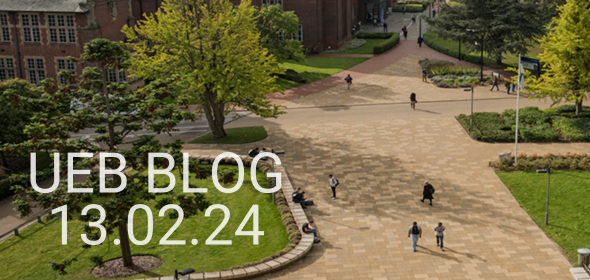Author: Shaun Williams, Executive Director Engagement and Advancement

- This week’s meeting started with an update on our complex website transformation project, which has been tackling the challenges of a historic digital Wild West of more than 4 million web pages on our domains, many unfindable; the need to migrate to a new website platform; the need to ensure our website fully meets strict digital accessibility requirements; and legacy issues with some of our data. All of which has, at times, made this a difficult project, and one which has at times led to some understandable frustrations. UEB heard that over the last 12 months significant further progress has been made, under the auspices of the new Website Oversight Board, and in consultation with academic colleagues, including through a new Web Insight Forum. This has seen a programme to grow the population of Research Groups, centres and Institutes on the new Drupal platform, with 215 research entities now established on the new platform. In addition, a comprehensive independent Website Technical Review was commissioned to look at our website configuration to assess its fitness for purpose to meet the current and future requirements of the University, including a need to extend and devolve content management to selected colleagues in faculties. A new website content manager and a website content co-ordinator have been provided to each faculty, and, following extensive training, at the end of April these ten individuals will be able to manage content directly in the Drupal content management system. Over time, it is anticipated that more colleagues will be enabled to update content on the website – this is a first step. UEB welcomed the update and the clear progress being made and was keen to see the momentum maintained.
- Next, UEB discussed a paper about ensuring effective implementation and impact of our Civic Strategic Plan, and the Civic University Agreement that we signed with our five local Councils nearly a year ago. The opportunity to enhance our Civic role to an extent unprecedented in our University history is fully embedded for the first time in our University Strategy. In preparation for the signing of our Civic University Agreement, diverse regional partners confirmed priorities for collaborative action ranging from health and social inequalities to skills deficits, to economic and business underperformance, to environmental degradation, to rural and urban deprivation and more. Through our scale and breadth of excellence and international reach, we occupy an unrivalled position to step up to these local challenges. Across the University, there currently exists a wide variety of definitions of Civic activity and broad understandings of what it means to be a Civic University. The risk is our Civic activity becomes unmanageably broad, diluted in impact, and falls outside any meaningful quality assessment including of value for investment of funds, time and the efficient use of colleague talent. To avoid this, UEB agreed a recommendation to focus resources on core Civic Activity underpinned by some guiding criteria with goals and impact that reflect the outstanding and differentiating strengths of the University of Southampton. The seven priority areas under the Civic University Agreement, which will shape our civic impact over the next five years, are: Education, Learning & Future Jobs; Research, Innovation, Enterprise, Business & Economic Growth; Staff, Students and Graduate support and retention; Health and Wellbeing; Improving the quality and cultural life of our places; Environment, Sustainability, Decarbonisation and Biodiversity; and Social Justice and Equality. UEB fully recognises and supports the importance of this work, as we know many of our staff do, and it is very clear that our civic partners are already seeing a major step change in our engagement and impact.
- UEB noted a paper summarising our continuing obligations in respect of holding a publicly traded bond. This means that some material issues that would likely have an impact on the trading price of the bond, such as financial statements and new market opportunities, need to be kept fully confidential internally until such time as they will be made public, usually through the investor relations pages on our website.
- Finally, UEB approved proposed changes to the Directorships of a number of our subsidiary companies, in part as a consequence of the forthcoming departure of Julie Fielder, our Executive Director of Finance and Planning; UEB noted a Risk Management Report to be considered by our Council’s Audit and Risk Committee, including an update on recent changes to the Risk and Resilience team and a management response to the recent risk management audit by KPMG; and there was the regular review of the University Risk Register.